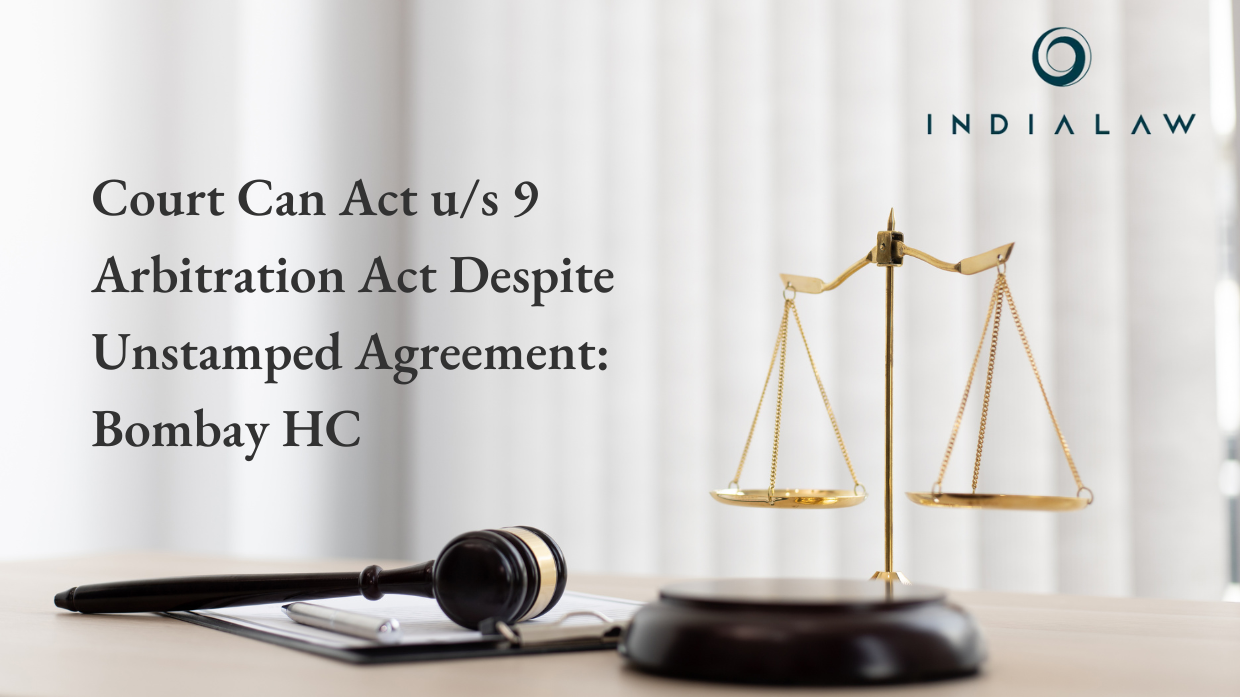Court Can Exercise Power u/s 9 of Arbitration Act Even if Arbitration Agreement is Not Duly Stamped: Bombay High Court

The Bombay High Court (“HC”) in L&T Finance Limited v. Diamond Projects Limited and 4 Other Petitions held that under Section 9 of the Arbitration and Conciliation Act (“Act”) there is no need to determine the validity of Arbitration Agreement. The Court clarified that an interim relief be granted on three-fold test that consists of: (a) prima facie case (b) balance of convenience and (c) irreparable injury.
Further, the HC clarified that an insufficiently or inadequately stamped document/ agreement/ instrument shall not preclude any party from seeking interim measures as provisioned under Section 9 of the Act.
Background of the case
The HC was hearing a batch of five petitions filed for interim relief/measure at a pre-arbitral stage. The point for determination is all matters was similar, as each Respondent had contested the petition on the ground that the arbitration agreement or the arbitration clause in the agreement/instrument is insufficiently stamped or unstamped as per the provisions of Maharashtra Stamps Act on Indian Stamp Act; hence cannot be treated as existent Agreement and therefore unenforceable.
Contentions of the Petitioners
The Constitution Bench decision in N.N. Global Case[i] does not affect the Court’s ability to grant interim measures under Section 9 of the Act, as the bench was dealing with Section 11 Applications and declared them as “non evidentiary” while Section 9 petitions are for protection and preservance of the subject matter of agreement. That only when the proceedings are at the stage of evidence before the Court, it is crucial to examine whether the contract is sufficiently stamped thereby rendering it valid. Therefore, at the stage of section 9, appreciating evidence would not arise and therefore there is no requirement to ascertain payment of sufficient stamp duty. That the object of the legislation of section 9 is to protect the property of an arbitration agreement and merely due to a defect, which can be cured later, interim measures cannot be denied. The power of the Court to grant interim relief under Orders XXXIX of the Civil Procedure Code, 1908 (CPC) would not be affected due to the inadequacy of the Arbitration Agreement.
Contentions of the Respondents
It was argued that even though the Constitution Bench in N.N Global Case, has not considered section 9 petition under the purview of this judgment, it has declared an agreement as void/invalid, based on the issue of insufficient stamping and that any adjudication on such an agreement under section 9 would render the agreement as existent and valid. The Court can exercise power under Section 9 of the Act only when the Agreement is valid. That an inadequately stamped Agreement is not valid and therefore unenforceable in law and hence seeking any interim relief based on unenforceable document is not maintainable. That the objection raised is not technical in nature rather it is based on enforceability of the Agreement. It was submitted that for a contract under section 7 of the Arbitration Act, should satisfy all the requirements of a requisites provided in t e Contract Act, 1872.It was also emphasized that the legislature of stamp act would be defeated if its unenforced in its true sense i.e. insufficient stamping does not raise concern of a technical objection instead rejects the agreement is its existence.
Findings of the Court
The HC clarified that the decision in N.N. Global Case has no effect on the Court’s power to grant interim measures under Section 9 of the Act and that the Court can exercise its power irrespective of the fact of inadequate or insufficient payment of the stamp duty on an Agreement.
The HC further stated that denying a party an interim relief sought under Section 9, only on the basis that the document not duly stamped will cause unnecessary burden on the party from which it may not intend to evade.
The Court clarified that Section 11 of the Act deals with the appointment of arbitrators and the Court must examine the very existence of a valid arbitration agreement. Under the said provision, the HC must ensure that the Agreement is valid and duly stamped. There is a distinction between the purposes of Section 9 and 11 of the Act.
While referring to a decision of the same Court pertaining to the maintainability of Section 9 petition in an unstamped document, in Universal Enterprises v. Deluxe Laboratories[ii], wherein it was held that the Court was not required to determine the existence of an arbitration agreement, even at the prima facie stage before granting an interim relief under Section 9 of the Act.
Decision of the Court
The Court concluded that while exercising power under Section 9, the admissibility of documents based on not being duly stamped cannot act as a barrier to grant interim measures. The issue of admissibility of a document should be dealt with at a later stage of proceedings while producing it for admission during evidence.
The Court stated, “In short, Section 9 enable the Court to exercise its jurisdiction and pass such orders, as are required to maintain substratum of the subject matter of the arbitration, though the Court may not return a finding on the merits of the claim made or a dispute raised by the parties before the Arbitrator.”
Further, the Court clarified that interim relief can be granted by the Courts under Order XXXIX of the CPC even on inadequately stamped documents underlying the agreement. The Court clarified that power under Section 9 must be exercised similarly. It stated that “For considering the relief under Section 9, the Court cannot be stopped in its track if it is satisfied that case has been made out by the petitioner for grant of interim relief.”
[i] N.N. Global Mercantile Private Limited v. Indo Unique Flame Ltd. Civil Appeal No(s). 3802-3803 of 2023 [ii] 2016(5) Mh.L.J 623
By entering the email address you agree to our Privacy Policy.



